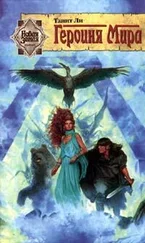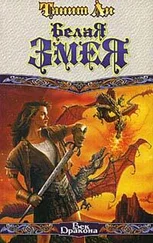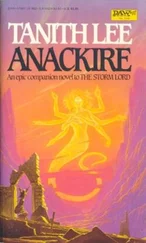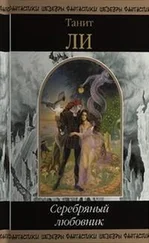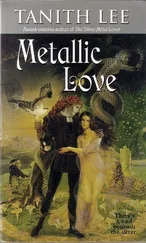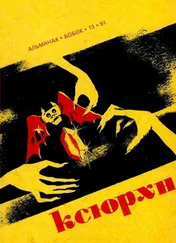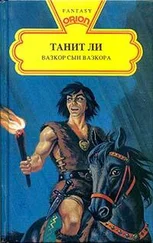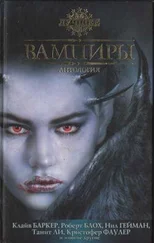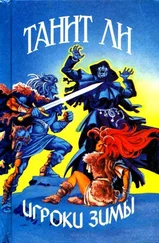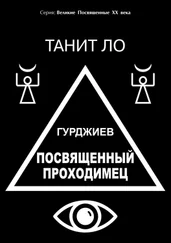“Eat,” said the husband. “We’ve plenty.”
But he could not eat, as he could not leave them. Just as he could not ask her for the past.
Shadows began to come, and a brown candle was lit.
The husband fell asleep. The woman rocked her youngest child, the other children, who had settled indoors like pigeons for the food, grouped sleepily at her skirts.
“Tell us,” said the elder girl, “the story about the wolves.”
And Rem, a mature man who had lived by three or four trades of death and by the hard edges of his brain, felt his heart stop.
She told them.
As she spoke, in the way of her child, he pictured it. The images came, conveyed by her murmuring. And sounds, and scents, all of it. All.
When the white wolf appeared like a thing of snow on the rock above her, she had screamed and help had been far away, unhearing.
After a while, the wolf came toward her, and she tried to run, but the wolf and its fellows caught her up. They loped around her, shutting her inside a wall of their own bodies. All through this she held the baby, and all through this, as she shrieked and wept and ran and fell to her knees, the baby remained quiet. Finally, the wolves nudged Berinda. They nudged her in such a way that she knew she had to get to her feet. So she did. Then they began to nudge her again, and she discovered they were unroughly pushing her toward some other place.
In abject horror, she obeyed. After a distance of rocks and uplands, twisting, climbing, the heat of the wolves’ mouths soaking through her clothing every time they nosed her on, there was a cave. It was a wolf cave, and it stank of wolves and the things wolves had killed. But it had begun to rain, and the cave was out of the rain. Berinda went into the cave and here she sat down for sheer fatigue, and dropped into a sort of dreadful doze.
When she woke, the wolves lay against her. She watched, some slept. The warmth of their bodies was a comfort. The stench in the cave seemed less now that she was more accustomed to it. Berinda, who had grown up in squalor at Xai, had spent her earliest years among the stink of humans, where disease had augmented poverty. The wolves themselves did not smell bad, for they had health. There was the difference.
Later, other wolves trotted in. Berinda was afraid, as if these newcomers might not show the same consideration as the first wolves. But they seemed indifferent. More, they had brought in a kill. Growling, the pack savaged the bloody carcass into parts. At length, a piece of the raw meat was brought to Berinda. She could not stomach it the first day. But the next, when again she was brought something, she did eat it.
By then, she was feeding the child, sitting there in the midst of them. They seemed to respect this duty, and some would stare, wagging their tails like dogs.
With nudgings and tuggings and pullings and whines they managed to conduct her where there was a stream. When the spring began to open the land, she found fruits under the ice and ate them. She offered them to the wolves also, and the wolves ate from her hands.
She was grateful for their warmth in the cold of the nights. She was solaced by their bodies’ liveness against her. She had long ceased to be afraid.
For Berinda, “gentle” as she was, was also a wild thing. To her it came, with more facility than to most, to be at one with the wolves. She reacted with the straightforwardness of a child.
And the child too, accepted and accepting, bloomed in the midst of the cave, or slept in Berinda’s lap in the weak sun of the hillside. She would even leave the baby among them for short intervals, as she wandered with the wolves or by herself.
When the summer came, four of the wolves showed her that they were leaving the cave and she and the baby were to go with them.
She was sorry, but the call of the summer running of the wolves infected her, and she did not hang back. They went south. She did not say this, but it was apparent. Also the impressive distance.
All the way, the wolves fed her and companioned her, as ever. Perhaps she had unremembered mankind. It seemed so from her narrative. Certainly the wolves had generally been nicer to her than men.
Thus, when one of the wolves urged her to a spot where a village could be seen among grain fields, Berinda evinced no special wish to approach it.
But the wolf wanted to approach the village, so they went together, playing through the tall stalks of the young grain. The child had been left behind on the slopes.
All at once the wolf and Berinda emerged into a thicket of people, who shouted, either retreating or hurling things. The wolf ran, and Berinda turned to run—and the people took hold of her, rushing her to the shelter of the village.
In vain she tried to free herself. In vain she tried to tell them how she must go after the wolves, to her baby. Her human speech had suffered. They took her noises for hysteria. When, the backlands of Lan being what they were, they did understand and believe her, it was too late. The wolves and the child were gone. Gone forever. She ran about the hills crying for them, to no avail. Washed clean of the wolf smell, her arms empty of love, Berinda wept in the village street and slept in it, refusing kindliness, bereft.
It was here that the man had found her. He was kinless and wifeless, and Zastis was near. The pretty aura of Karmiss was not all faded from Berinda. Something in her despair, besides, touched him. He wooed her in some way, maybe merely by caring particularly and only for her.
She went home with him, timid at first. But his goodness was not an act, not a fluke. Then the magic was achieved, the magic Kesarh had worked with her, better than Kesarh’s magic, for this child lived. Her arms were full again of love.
And here she was now, her bright eyes bathed with it, and laughter lines about her mouth.
“And when,” said the older girl, gazing up into Berinda’s face, “did you find me again?”
It was plainly a ritual question. The dark child believed she was the baby the wolves had taken, who had somehow sorcerously been reinserted and brought forth a second time.
When Berinda replied, it was sure that she thought so too.
“When my womb swelled, it was you.”
“But where had I been till then?”
“Riding the air,” Berinda said. And the children and Berinda laughed.
Something in the phrase arrested Rem, even through all the rest. The air-borne soul outlawed, waiting—like the ancient Dortharian belief that some souls returned at once, through the medium of their fleshly got unborn children, or the children of their kindred. Hence that insanity of the Storm Lords that not the eldest son, but the last son conceived before a King’s death, must be his heir. The foible which had granted Raldnor Am Anackire a right to the Koramvin throne.
The dark child looked over at Rem, infallibly guessing he had been an assenting party to the whole outrageous tale.
“In winter,” she said, “wolves come to the door and we feed them. From our hands. We’re not afraid. Nor they.”
He assented to that, too.
The world had given way. To feed wolves like poultry was a little thing.
“There’s someone in the field,” the elder boy said.
Berinda turned, unflurried, to look at the doorway.
Rem got up.
He went to the door and out, and saw a man sitting a zeeba, leading another, against the whole pane of violet hill sky, staining crimson in the east from star-rise.
“I’m glad I found you,” said Lur Raldnor. “We didn’t get the wolf, but there’s wolf-scent everywhere up here, the dog’s almost mad with it.” His face was like a stone.
“How long have you been looking for me?”
“Since I went back from the pool and no one could see you. The dog helped.”
Читать дальше

